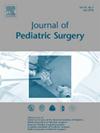真空钟疗法治疗乳房下垂:单个中心的长期经验。
IF 2.5
2区 医学
Q1 PEDIATRICS
引用次数: 0
摘要
目的:评估接受真空钟疗法(VBT)的鸡胸患者获得良好矫正效果的相关因素:方法:2012 年 11 月至 2023 年 4 月,对接受 VBT 治疗的患者的矫正情况进行评估。收集了患者的人口统计学资料、发病情况和结果。优秀矫正的定义是完全矫正或比平均标准胸深 0.51 厘米改善 >100%。数据采用几率比率和置信区间以及配对 t 检验比较进行报告。结果对 431 名患者进行了 VBT,其中 278 名患者被纳入,153 名患者因失去随访或数据不完整而被排除。在纳入的患者中,89% 为男性。31 名患者矫正效果极佳(11%),247 名患者矫正效果不佳。初始胸腔深度小于 1.5 厘米和胸壁柔韧性仍然是预测积极结果的重要因素(分别为 p=0.008 和 <0.001)。据统计,8 至 12.9 岁的患者更有可能获得最佳矫正效果(OR = 2.2,p = 0.039)。仅有15.5%的患者(278例中的42例)在VBT后进行了手术矫正,其中无一例外都是矫正效果极佳的患者:结论:一小部分患者通过 VBT 获得了极佳的乳房下垂矫正效果,年龄较小、缺陷较轻、胸壁柔韧性较高的患者的治疗效果更好。这些数据可用于帮助确定那些更有可能通过非手术方法实现完全矫正的患者,并指导治疗方法的决策。本文章由计算机程序翻译,如有差异,请以英文原文为准。
Vacuum Bell Therapy for Pectus Excavatum: Long-term Experience at a Single Center
Aim
To evaluate factors associated with excellent correction in pectus excavatum patients undergoing vacuum bell therapy (VBT).
Methods
A single-institution retrospective chart review was performed November 2012–April 2023 to assess corrections of patients who underwent VBT. Patient demographics, presentation, and results were collected. Excellent correction was defined as complete correction or >100 % improved from an average standard chest depth of 0.51 cm. Data are reported using odds ratio & confidence intervals; and paired t-test comparison. A p-value of <0.05 was regarded as significant.
Results
VBT was utilized in 431 patients with 278 patients included and 153 excluded due to loss of follow-up or incomplete data. Of those included, 89 % were male. There were 31 patients with excellent corrections (11 %) and 247 non-excellent corrections. Initial chest depth < 1.5 cm and chest wall flexibility remain important predictors of positive outcome (p=0.008 and < 0.001, respectively). Excellent correction was statistically more likely in patients aged 8 to 12.9 (OR = 2.2, p = 0.039). Surgical correction following VBT was performed in only 15.5 % (42 of 278) of our patients, none of which were in the group with an excellent correction.
Conclusion
Excellent correction for pectus excavatum via VBT was achieved in a small proportion of patients, with improved outcomes in those initiating therapy at a younger age, with a mild defect, and with increased chest wall flexibility. These data may be used to help determine those more likely to achieve complete correction from a nonsurgical approach and guide decisions towards treatment methods.
求助全文
通过发布文献求助,成功后即可免费获取论文全文。
去求助
来源期刊
CiteScore
1.10
自引率
12.50%
发文量
569
审稿时长
38 days
期刊介绍:
The journal presents original contributions as well as a complete international abstracts section and other special departments to provide the most current source of information and references in pediatric surgery. The journal is based on the need to improve the surgical care of infants and children, not only through advances in physiology, pathology and surgical techniques, but also by attention to the unique emotional and physical needs of the young patient.

 求助内容:
求助内容: 应助结果提醒方式:
应助结果提醒方式:


